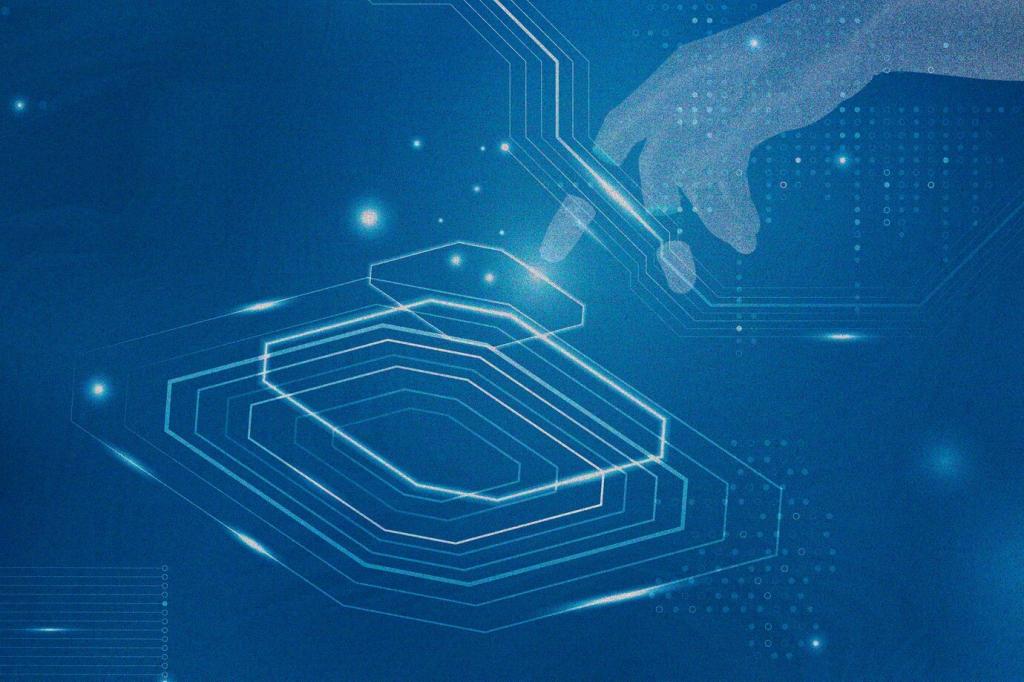
Blockchain Use Cases in Business
Blockchain technology is rapidly transforming the way businesses operate by introducing innovative solutions to various challenges across industries. Its unique combination of security, transparency, and decentralization offers unparalleled advantages for modern enterprises. As more organizations seek to gain a competitive edge and foster trust, the implementation of blockchain across different business processes continues to expand. This page explores the diverse and impactful ways blockchain is being utilized in the world of business, highlighting key applications and their significance for driving efficiency, reducing risks, and unlocking new opportunities for growth.
Supply Chain Transparency
Real-Time Tracking and Traceability
Businesses can leverage blockchain to track the movement of goods at every stage, enabling real-time transparency into the journey of products. By recording each handoff and transformation on an immutable ledger, stakeholders gain unprecedented visibility, which helps prevent fraud, counterfeiting, and quality control issues. In industries like food and pharmaceuticals, where safety is paramount, blockchain traceability means companies can swiftly pinpoint origins and respond proactively to recalls or contamination events. This not only minimizes risks but also strengthens brand reputation by assuring customers of a product’s authenticity and ethical journey.
Authenticity Verification
Ensuring the authenticity of goods—from luxury items to critical components—is a growing challenge as counterfeit products proliferate globally. Blockchain’s tamper-proof records allow businesses and consumers to instantly verify a product’s origin and journey. Manufacturers can issue digital certificates stored on the blockchain, certifying the genuineness of each item. When a product changes hands, each transfer is recorded transparently, making it virtually impossible to manipulate or duplicate ownership records. This capacity for unalterable record-keeping is particularly valuable in markets prone to forgery, such as diamonds, electronics, and designer goods.
Supplier Collaboration and Accountability
Blockchain fosters more robust collaboration and accountability among supply chain partners. Traditionally, disjointed systems and fragmented data led to miscommunications and inefficiencies. By unifying data onto a decentralized ledger, every transaction or agreement is accessible to relevant parties in real time. Smart contracts can automate compliance checks and payment releases when conditions are met, ensuring suppliers deliver as agreed. This level of visibility and automation reduces disputes, expedites resolutions, and encourages better performance across the chain, resulting in leaner, more agile supply networks.

Cross-Border Payments and Settlement
International money transfers have traditionally been slow, expensive, and opaque due to multiple intermediaries and varying regulatory systems. Blockchain enables near-instantaneous cross-border payments by creating a single, trusted ledger shared among participating entities. Transactions can be executed directly between parties, reducing costs, delays, and errors. Furthermore, each transaction is recorded with time-stamped immutability, simplifying audits and compliance checks. This is particularly beneficial for businesses operating in multiple currencies or across emerging markets, allowing them to serve customers globally around the clock.

Fraud Reduction and Security
Financial fraud, from identity theft to transaction manipulation, poses significant risks. Blockchain’s cryptographic features and decentralized consensus mechanisms make it extremely challenging for malicious actors to alter financial records undetected. Every change to the ledger is transparently recorded and verified by network participants, ensuring robust defense against tampering. In addition, blockchain’s ability to digitize and automate compliance checks further reduces vulnerabilities, giving financial institutions and their clients greater peace of mind while promoting regulatory trust.

Smart Contracts for Loans and Insurance
Smart contracts—self-executing agreements coded onto blockchains—are transforming lending and insurance by minimizing paperwork, manual oversight, and processing delays. For loans, smart contracts can automatically validate borrower credentials, disburse funds, and trigger repayments based on predefined rules. In insurance, they streamline claims processing, instantly releasing payments when covered events are verified on-chain. This improves operational efficiency, reduces administrative burdens, and delivers a faster, more seamless customer experience, transforming the backbones of financial operations.
Digital Identity Management
Self-sovereign identity is an emerging model where individuals control their own digital identities without reliance on centralized authorities. Powered by blockchain, these identities are cryptographically secured and can be selectively shared with businesses or service providers. Verification can occur instantly, and personal data remains under the owner’s control at all times. This approach reduces the risks of data breaches and identity theft while simplifying onboarding processes for services like banking, healthcare, or travel.
Previous
Next
Previous slide
Next slide

Tokenization of Assets
Real Estate Fractional Ownership
Real estate investments traditionally require significant capital, limiting access for smaller investors. Blockchain-based tokenization divides property ownership into digital shares, allowing individuals to own fractions of valuable assets. Each token represents a verified stake, enabling easier transfer, trading, and liquidity in real estate markets. This democratization of investment can significantly broaden participation while simplifying management and reducing transaction costs commonly associated with property transfers.
Equity and Securities Management
Managing company shares and securities involves complex administrative tasks, from cap table management to regulatory compliance and transfer tracking. Tokenization streamlines these processes by converting equity stakes into blockchain-based tokens, automating record updates and transactions with transparent, immutable logs. This facilitates efficient private share transfers, real-time updates to ownership ledgers, and enhanced oversight for both businesses and investors. It also lays the groundwork for secondary trading and increased liquidity in traditionally illiquid markets.
Tokenized Loyalty Programs
Businesses frequently run loyalty programs to engage and reward customers, yet these systems often lack interoperability and flexibility. Blockchain-based tokenization enables the creation of branded loyalty tokens that can be accumulated, redeemed, or even traded across participating merchants or services. This creates a more engaging customer experience, increases the perceived value of rewards, and attracts broader participation in loyalty ecosystems. Smart contracts can automatically calculate and distribute rewards, ensuring accuracy and reducing administrative overhead.

Intellectual Property and Copyright Protection

Transparent Proof of Creation and Ownership
Blockchain enables creators to register their works—be it art, music, documents, or inventions—as unique digital assets with time-stamped proof of creation. The immutable ledger offers a permanent, transparent record that verifies the origin and authorship of any asset. This proof not only helps resolve disputes over ownership but also underpins legal claims. Businesses and creatives alike can protect their innovations by ensuring that every creation date and transfer of ownership is auditable and secure.

Rights Management and Royalty Distribution
Managing royalties and tracking the usage of intellectual property across the Internet is highly complex, leading to underpayment or improper compensation. Blockchain automates rights management by encoding distribution agreements into smart contracts, which monitor usage and instantly allocate payments whenever the asset is accessed or sold. Artists, developers, and rights holders benefit from direct, transparent, and timely compensation, while businesses gain reputational advantage by ensuring fair treatment—all without extensive manual oversight or intermediaries.

Counterfeit Detection and Enforcement
The proliferation of digital and physical counterfeits hampers legitimate businesses and endangers consumers. Blockchain facilitates tamper-proof authentication, allowing each item or digital work to be tracked through its entire lifecycle. By scanning codes linked to blockchain records, anyone can verify a product’s legitimacy, reducing the success of counterfeit goods. In the digital realm, watermarked assets and cryptographic signatures enable rights holders to monitor usage and act swiftly against infringement, protecting both revenue and brand integrity.
Human Resources and Payroll Solutions
Credential Verification and Background Checks
Verifying educational and professional credentials is time-consuming, often requiring contact with multiple institutions or verification agencies. Blockchain-based credentialing allows employees to store verifiable records of their qualifications on a decentralized ledger. Employers can instantly confirm the authenticity and origin of certificates, licenses, and employment histories. This eliminates fraud, speeds up hiring, and ensures that only properly qualified individuals are considered for sensitive roles.

